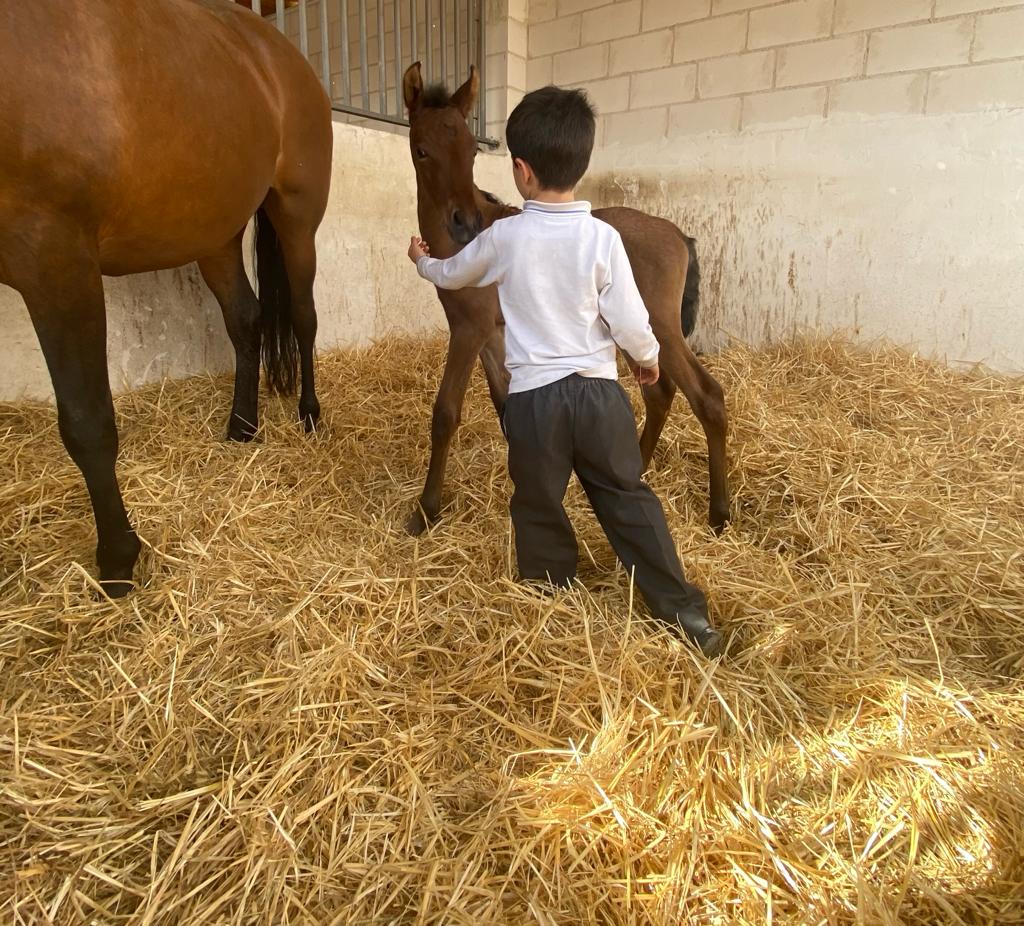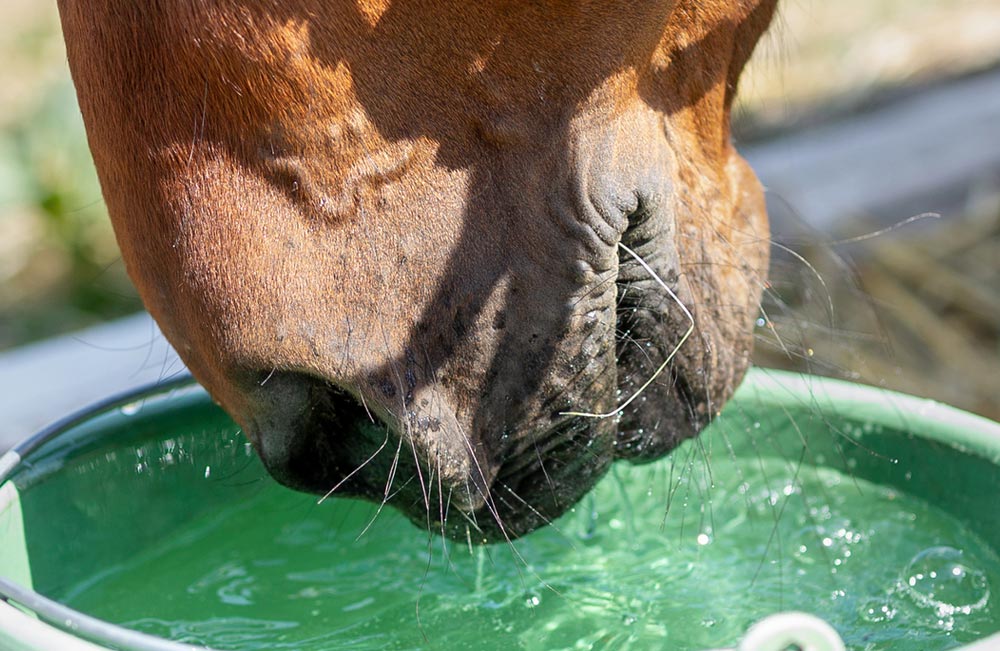Another Year with
O-Colic Incidents
O-Colic Incidents
Yeguada MAC is pleased to announce a year free of colic incidents, underscoring our unwavering commitment to the health and well-being of our horses, mares, colts, and fillies. We share our strategies, preventive practices, and protocols with all horse enthusiasts.
Understanding Colic Causes
Digestive Issues: Intestinal blockages, twists, impactions, or irritations in the digestive tract.
Diet Changes: Sudden alterations in feeding, such as abrupt changes in feed type or pasture, can trigger colic.
Inadequate Water Intake: Lack of constant access to clean water at a pleasant temperature, cool in summer, not too cold in winter, and reduced water intake, especially in extreme climates, may contribute to colic.
Internal Parasites: Parasitic infestations can cause discomfort and problems in the digestive system.
Stress: Factors like transportation, changes in environment or routine, and stressful situations can predispose horses to colic.
Dental Issues: Difficulty chewing properly due to dental problems can contribute to colic.
Preventive Measures
Maintain a balanced diet and make dietary changes gradually. Implement changes progressively, adjusting small quantities, and keep the feeding program stable for at least 15 days.
Minimize stressful situations and provide a stable environment. Before, during, and after transportation or relocation, engage with the horse, create a comfortable space, base their diet on dampened hay, omitting grains or cereals for the first 12 hours to allow emotional stabilization. Introduce feed gradually and maintain quantities for 15 days to facilitate adaptation.
Ensure your horse has constant access to clean water at a pleasant temperature based on ambient conditions. Cool in summer, not too cold in winter.
Deworm your horse at least twice a year, in spring and fall, using different molecules for improved effectiveness against parasites. We prefer using Moxidectin in spring and a combination of Praziquantel and Ivermectin in autumn.
Schedule regular dental check-ups, at least twice a year.
Horses need daily movement for proper intestinal transit. Exercise can include walks, lunging, turnout, or training. Consistency is key.
Horses always give signals. Our check-in times are during the four meals distributed at specific hours with balanced intervals. We provide sufficient forage, and we favor straw bedding. Horses are herbivores, and their digestive system requires regular functioning. If a horse, mare, colt, or filly that usually eats with appetite doesn’t approach the feeder at mealtime, an alarm is triggered.
Preventive Measures
Maintain a balanced diet and make dietary changes gradually. Implement changes progressively, adjusting small quantities, and keep the feeding program stable for at least 15 days.
Minimize stressful situations and provide a stable environment. Before, during, and after transportation or relocation, engage with the horse, create a comfortable space, base their diet on dampened hay, omitting grains or cereals for the first 12 hours to allow emotional stabilization. Introduce feed gradually and maintain quantities for 15 days to facilitate adaptation.
Ensure your horse has constant access to clean water at a pleasant temperature based on ambient conditions. Cool in summer, not too cold in winter.
Deworm your horse at least twice a year, in spring and fall, using different molecules for improved effectiveness against parasites. We prefer using Moxidectin in spring and a combination of Praziquantel and Ivermectin in autumn.
Schedule regular dental check-ups, at least twice a year.
Horses need daily movement for proper intestinal transit. Exercise can include walks, lunging, turnout, or training. Consistency is key.
Horses always give signals. Our check-in times are during the four meals distributed at specific hours with balanced intervals. We provide sufficient forage, and we favor straw bedding. Horses are herbivores, and their digestive system requires regular functioning. If a horse, mare, colt, or filly that usually eats with appetite doesn’t approach the feeder at mealtime, an alarm is triggered.
Immediate Actions in Case of Colic
- Immediately put on the stable halter and move them to the covered round pen to start walking at a walk.
- Observe if the horse scratches the ground, attempts to lie down or It looks at its flank, as these are signs of pain. DO NOT ALLOW THEM TO LIE DOWN OR ROLL, as it could be the origin of a twist, and the result could be fatal.
- Have someone bring water in a container your horse can drink from. Each time you change direction, invite them to drink and stimulate them by putting your hand in the water and making noise; they’ll feel encouraged to drink.
- We administer a probiotic syringe, which isn’t a treatment but works for us, aiding the first expulsion of stools, the most compact and least moist. From there, everything begins to flow.
- Call your veterinarian to alert them and follow their instructions.
- Once the horse, mare, or colt has walked for about 15-20 minutes at a walk, encourage them to trot steadily. This will help intestinal motility.
Always seek the supervision of a veterinarian for proper horse health management and to address any issues early.
In addition to these measures, we discovered Aloe Vera juice as a healthy and natural alternative, increasing fiber intake, retaining moisture, and reducing inflammation in the intestinal tract. We administer it in summer and during seasonal changes. A small amount, 10 milliliters per horse, is sufficient, and we mix it with feed. It’s pleasant, and all horses, mares, colts, and fillies accept it perfectly. We prefer it over salt because, while salt may make horses “thirstier,” the reality is that a significant portion of the ingested water will be used to eliminate excess sodium from their urinary system. In summer, oil provides excess calories, causing them to eliminate water through sweat. We stick with Aloe Vera juice specifically for horses.







